Search results for "sofi oksanen/feed/www.booksfromfinland.fi/2012/04/2010/10/riikka-pulkkinen-totta-true"
Riikka Pulkkinen: Totta [True]
22 October 2010 | Mini reviews, Reviews
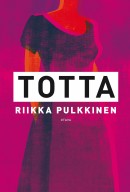 Totta
Totta
[True]
Helsinki: Otava, 2010. 333 p.
ISBN 978-951-1-22965-0
€ 31,40, hardback
The second novel by Riikka Pulkkinen (born 1980) is a comprehensive work that tackles big themes: love, death and rejection. Pulkkinen’s particular strengths as an author are her richly nuanced language and her mastery of structure. While the ending provides food for thought, the book is an enjoyable novel about childhood, growing up, daring to love and live. Martti, a seventy-year-old artist, is caring for his sick wife, a highly respected psychologist. Martti and Elsa have had a long and happy marriage. Then it emerges that Martti had a long affair with their live-in childminder Eeva, whose story grows into one of the main plot strands of the book. Their love story takes place against the background of the 1960s, when the waves passing through European society reached Finland as well. Pulkkinen skilfully brings the perspective of the now grown-up daughter Eleonoora into the mix, as she views her early childhood under the care of two mother figures. At the 2010 Frankfurt Book Fair translation rights to Totta were sold to six countries, which at least goes to show that there is interesting literature to be found in the Nordic countries beyond the ubiquitous crime novels.
RSS feeds
4 February 2009 |
Subscribe to our RSS feeds here.
- All categories: Books from Finland main RSS feed
/ Subscribe by email
By category:
- Fiction (extracts): RSS feed / Subscribe by email
- Drama: RSS feed / Subscribe by email
- Comics: RSS feed / Subscribe by email
- Poetry: RSS feed / Subscribe by email
- Prose: RSS feed / Subscribe by email
- Children’s books: RSS feed / Subscribe by email
- Non-fiction: RSS feed / Subscribe by email
- Reviews: RSS feed / Subscribe by email
- Authors: RSS feed / Subscribe by email
- This ‘n’ that: RSS feed / Subscribe by email
- Editorial: RSS feed / Subscribe by email
By subject (tag):
- Biography: RSS feed / Subscribe by email
- Children’s books: RSS feed / Subscribe by email
- Classics: RSS feed / Subscribe by email
- Contemporary art: RSS feed / Subscribe by email
- Finnish history: RSS feed / Subscribe by email
- Literary prizes: RSS feed / Subscribe by email
- Novels: RSS feed / Subscribe by email
- Photography: RSS feed / Subscribe by email
- Poetry: RSS feed / Subscribe by email
- Short stories: RSS feed / Subscribe by email
Des res
Extracts from the novel Juoksuhaudantie (‘The Trench Road’, WSOY, 2002)
Matti Virtanen
I belonged to that small group of men who were the first in this country to dedicate themselves to the home front and to women’s emancipation. I feel I can say this without boasting and without causing any bickering between the sexes.
A home veteran looks after all the housework and understands women. Throughout our marriage I have done everything that our fathers did not. I did the laundry, cooked the food, cleaned the flat, I gave her time to herself and protected the family from society. For hours on end I listened to her work problems, her emotional ups and downs and her hopes for more varied displays of affection. I implemented comprehensive strategies to free her from the cooker. I was always ready with provisions when she got home exhausted after a day at work. More…
Sofi Oksanen wins the 2008 Finlandia Prize
10 February 2009 | In the news

Sofi Oksanen. - Photo: Toni Härkönen/WSOY.
The Finlandia Prize for Fiction, Finland’s most prestigious literary prize, was awarded to Sofi Oksanen’s novel Puhdistus (‘Purge’, WSOY, 2008). ‘When the concentrated focus of drama and the multidimensionality of narrative conjoin, Puhdistus is born – a muscular, harsh, and solid book’, said the writer and critic Pekka Tarkka awarding the prize on 4 December. (For a short review, see the Review section.)
The prize, worth € 30,000, was awarded for the twenty-fifth time. The final choice was made from the shortlist of six candidates; the others were 14 solmua Greenwichiin (‘14 knots to Greenwich’, Otava) by Olli Jalonen, Kosmonautti (‘The cosmonaut’, Tammi) by Katri Lipson, Marie (Otava) by Arne Nevanlinna, Kohtuuttomuus (‘Excess’, Siltala) by Pirkko Saisio and Paholaisen haarukka (‘The Devil’s fork’, WSOY) by Juha Seppälä. More…
Solzhenitsyn and Silberfeldt: Sofi Oksanen publishes a best-seller
25 April 2012 | In the news
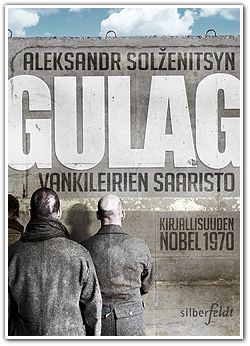
Nobel Prize 1970: Aleksandr Solzhenitsyn
After falling out with her original publisher, WSOY, in 2010, author Sofi Oksanen – whose third novel, Puhdistus (Purge, 2008), has become an international best-seller – has founded a new publishing company, Silberfeldt, in 2011, with the aim of publishing paperback editions of her own books. Its first release was a paperback version of Oksanen’s second novel, Baby Jane.
Oksanen’s new novel, Kun kyyhkyset katosivat (‘When the pigeons disappeared’), again set in Estonia, will appear this autumn, published by Like (a company owned by Finnish publishing giant Otava).
However, in April Silberfeldt published a new, one-volume edition of the autobiographical novel The Gulag Archipelago by the Nobel Prize-winning author Alexandr Solzhenitsyn. This massive book was first published in the West in 1973, in the Soviet Union in 1989.
A Finnish translation was published between 1974 and 1978. Back in those days of Cold War self-censorship, Finnish publishers felt unable to take up the controversial book, and the first volume was eventually printed in Sweden. The work, finally published in three volumes, has long since been unavailable.
This time the 3,000 new copies of Solzhenitsyn’s tome sold out in a few days; a second printing is coming up soon. Oksanen regards the work as a classic that should be available to Finnish readers.
Jonna Pulkkinen: Kieltolaki. Kielletyn viinan historia Suomessa. [Prohibition. A history of prohibited liquor in Finland.]
29 June 2015 | Mini reviews, Reviews
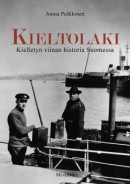 Jonna Pulkkinen
Jonna Pulkkinen
Kieltolaki. Kielletyn viinan historia Suomessa. [Prohibition. A history of prohibited liquor in Finland.]
Helsinki: Minerva, 2015. 213pp., ill.
ISBN 978-952-312-112-6
€32,90, hardback
Prohibition of the making and selling of strong liquor was in force in Finland between 1919 and 1932. In this approachable book, the journalist and non-fiction writer Jonna Pulkkinen charts Finnish attitudes to alcohol over the ages and describes the origin and effects of prohibition. Total abstinence was popular in Finland in the second half of the 19th century, and was adopted in particular by the working class. Limits on alcoholic consumption were first imposed as early as the First World War. When a prohibition law that had been passed a couple of years earlier came into effect in newly independent Finland in 1919, however, support had already begun to dwindle. Home stills proliferated, smuggling from abroad was considerable and broadly accepted, and enforcing the law was difficult. Pulkkinen has numerous interesting and even comical examples that flouted the law on prohibition. The law was broken in all social classes, the use of liquor and crime increased throughout the country, and taxation income on alcohol was lost. As public criticism grew, an advisory referendum was held in 1931, and as a result the prohibition law was abolished the following year.
Nordic prize to Sofi Oksanen
31 March 2010 | In the news
The Nordic Council’s Literary Prize 2010 has been awarded to Sofi Oksanen for her novel Puhdistus (‘Purge’, WSOY, 2008).
The winning novel was selected by a jury from a shortlist of 11 works from the Nordic countries. The prize, worth approximately 47,000 euros, will be awarded in Reykjavik in November.
The novel, about women’s fates in the violent history of 20th-century Estonia, was awarded both the Finlandia Prize for Fiction and the Runeberg Prize in Finland, where it has sold more than 142,000 copies.
So far publication rights have been sold to 27 countries; the English translation, by Lola Rogers, will appear next month in the US, published by Grove Press.
Sofi Oksanen: Puhdistus [Purge]
5 February 2009 | Mini reviews
![Sofi Oksanen: Puhdistus Sofi Oksanen: Puhdistus [Purge]](https://booksfromfinland.fi/wp-content/uploads/2009/02/puhdistusweb-130x164.jpg) Puhdistus
Puhdistus
[Purge]
Helsinki: WSOY, 2008. 380 p.
ISBN 978-951-0-33973-2
€ 29.90, paperback
Sofi Oksanen’s first play Puhdistus (‘Purge’) was staged at Finland’s National Theatre in 2007. Oksanen (born 1977) has an Estonian-Finnish background and studied at the Theatre Academy. Puhdistus, her third novel, retells the story of her play about two women and moves through the past by flashbacks between 1939 and 1992. Aliide has experienced the horrors of the Stalin era and the deportation of Estonians to Siberia, but she herself has to cope with the guilt of opportunism and even manslaughter. More…
Sofi Oksanen: Kun kyyhkyset katosivat [When the doves disappeared]
9 October 2012 | Mini reviews, Reviews
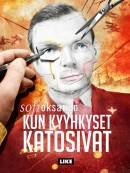 Kun kyyhkyset katosivat
Kun kyyhkyset katosivat
[When the doves disappeared]
Helsinki: Like, 2012. 365 p.
ISBN 978-952-01078-19
€ 27.90, hardback
Four years after the huge national and international success of her third novel Puhdistus (Purge, 2008, now translated into 38 languages), Sofi Oksanen has published a new novel to the accompaniment of trumpets and drums – a launch cruise to Tallinn, Estonia, workshops and public readings. The Finnish film version of Puhdistus received its world premiere at the same time. Oksanen has earned her star status as a writer, but Kun kyyhkyset katosivat is not as good as its predecessor. The story of Estonian freedom fighter (‘Forest Brother’) Roland and his cousin Edgar, an opportunist who manoeuvres his way through the Nazi and Soviet occupations of Estonia from 1941 until the apparent liberalisation of the 1960s, is thin and fragmentary. The language and style are uneven and diffuse, while Edgar’s chameleon-like shifts of identity from pro-German sympathies through Siberia to complicity with the KGB deserve to be more carefully explored. While the book’s themes are unquestionably authentic and relevant, they don’t really blend together into a moving novel in the way that Puhdistus does.
Translated by David McDuff
Prix Femina for Sofi Oksanen
5 November 2010 | In the news
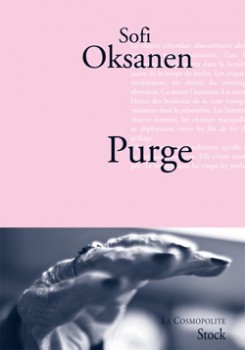 Sofi Oksanen’s novel Puhdistus (English translation, Purge, by Lola Rogers; French translation, also entitled Purge, by Sébastien Cagnoli), was awarded the French literature prize Prix Femina Étranger in early November.
Sofi Oksanen’s novel Puhdistus (English translation, Purge, by Lola Rogers; French translation, also entitled Purge, by Sébastien Cagnoli), was awarded the French literature prize Prix Femina Étranger in early November.
The Prix Femina was founded by the editors of the magazine La Vie heureuse (nowadays Femina) in 1904 as a counterbalance to the Prix Goncourt and the male-dominated award system. The jury members of Prix Femina are women only – whereas the prize can be awarded to either gender.
Among earlier winners of the Prix Femina Étranger – awarded since 1985 for the best foreign novel – are Amos Oz, Joyce Carol Oates and Ian McEwan.
The rights of Oksanen’s novel have so far been sold to 36 countries; Purge has sold approximately half a million copies the world over. In France – where the book also won the Le Prix du Roman Fnac in June – four print runs have sold more than 70,000 copies.
French prize for Sofi Oksanen
26 August 2010 | In the news
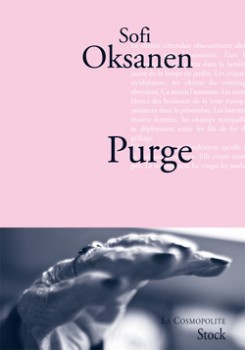 In August the ninth Prix du Roman FNAC was awarded to Sofi Oksanen (born 1977) for her novel Puhdistus (English translation, by Lola Rogers: Purge; see a recent British review [Guardian, August 21] here), to be published in French (by Editions Stock) on August 25 under the title Purge. This is the first time FNAC – the largest bookshop chain in France – has awarded the prize to an author who doesn’t write in French.
In August the ninth Prix du Roman FNAC was awarded to Sofi Oksanen (born 1977) for her novel Puhdistus (English translation, by Lola Rogers: Purge; see a recent British review [Guardian, August 21] here), to be published in French (by Editions Stock) on August 25 under the title Purge. This is the first time FNAC – the largest bookshop chain in France – has awarded the prize to an author who doesn’t write in French.
The jury consists of 900 booksellers and representatives from the general public. They read 300 novels published in France this year, and the winner was chosen out of 30 finalists.
The Finnish production company Solar Films Inc. will transform Puhdistus into a film in 2012: the screenwriter is Marko Leino.
Once more: Sofi Oksanen’s novel wins a prize
10 December 2010 | In the news
Sofi Oksanen (born 1977) has received the Europe Book Prize, worth €10,000, for her novel Puhdistus (Purge, 2008). Chosen from a shortlist of eight works, the prize was awarded by the ex-chairman of the European Union Commission, Jacques Delors, in Brussels on 9 December.
The European Book Prize jury is made up of European journalists and correspondents and was chaired by the German film director Volker Schlöndorff. According to the jury, Puhdistus is ‘a brave and painful exploration into the traumas of the Estonian history’.
The prize was awarded this year for the fourth time. The author expressed her appreciation of the prize by saying Europeanness for her signifies freedom of speech, respect for human rights and the will of sustaining these fragile and easily damaged values.
And the winner is…?
27 March 2012 | This 'n' that
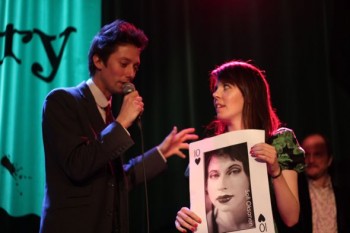
Playing your cards right: Todd Zuniga talks to Riikka Pulkkinen on 20 March in Helsinki. Photo: courtesy/T. Zuniga
The writer Johanna Sinisalo’s words lash the stage like the tail of Pessi the troll in her best-known novel. The novelist Riikka Pulkkinen bursts into deconstructive dance. The singer Anni Mattila translates the poet Teemu Manninen’s explosive poetic frolics into rhythmic dictations and the Finlandia Prize-winning author Rosa Liksom’s conductor’s glittering moustaches see the audience off on a train journey to Moscow.
On a March evening, a Literary Death Match has begun in the Korjaamo Culture Factory in Helsinki’s old tramsheds. The creation of the American author and journalist Todd Zuniga, the Literary Death Match combines an evening of readings with stand-up comedy as well as the judging familiar from reality TV shows.
‘It all started with me eating sushi with two of my friends and talking about some of the readings we’d been to. We all loved literature and loved to listen to writers reading from their own work. But the audience was always the same circle of people. We wanted to expand it beyond literary circles,’ Zuniga explains. More…


